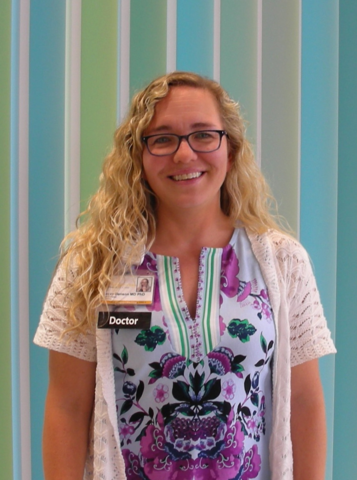
I grew up in Pella, Iowa.
How/when did you become interested in science and/or medicine?
I loved science classes in high school, so I knew I wanted to continue studying science in college. I couldn’t make up my mind what I wanted to be when I grew up, so I pursued a double major in Biochemistry and Spanish with Math and Religion minors. I finally decided that I wanted to go to medical school. As a Pediatric Pain and Palliative Care doctor, I use what I learned in all my college majors and minors to take the best possible care of my patients.
When did you join the University of Iowa faculty?
I joined the faculty here in 2011.
How or why did you choose to join the faculty at the University of Iowa?
I did MD/PhD training at Iowa, and was thrilled to get into the pediatric residency program here. During residency, I discovered my passion for palliative care. The Pediatric Palliative Care team was just getting started by an interdisciplinary team of healthcare professionals, and I was able to get funding to be the first pediatric palliative care physician on the team.
How do you see your faculty role impacting medicine and/or science?
I have had the opportunity to help develop several new programs and services, including the Pediatric Pain and Palliative Care Program and the Ethics Consult Service. Both of these venues have given me an opportunity to discuss profound issues with people who are experiencing serious illness. I appreciate being invited to come alongside and provide support for what can be a very challenging journey. My life has been made richer by helping people find meaning in difficult times, and to know that we can be a small part of making each day the best it can be for them.
What is the biggest change you've experienced in your field since you were a student?
The field of palliative care has been growing very rapidly and is being recognized as an integral part of helping someone to live well with their illness, and not as an option of last resort.
What one piece of advice would you give to today's students?
Sometimes people are surprised when I help a patient advocate for more invasive treatment or aggressive care. I try to make sure patients know what their options are and what the benefits and burdens are of different choices, and then help them find the treatment plan that is consistent with helping them meet their goals, based on their values.
In what ways are you engaged in professional activities outside the University (i.e. population based research, mentoring high school students, sharing your leadership/ expertise with organizations or causes, speaking engagement off campus, etc.)?
I have had many opportunities to encourage people to do advance care planning and to think about what they want in the future if their health worsens. None of us like to think about it, but we haven’t figured out a way to keep people alive forever yet. Talking about end of life outside of the hospital allows people to think about how they can find meaning in the mystery of life and death, and let others know what would be important to them at that time. I have also been on medical mission trips several times, and it helps me to see things from a larger perspective.
What are some of your outside (personal) interests?
I like to spend time with my three boys, especially outside. I like to grow food in my garden (or get fresh produce from my CSA) and then cook it up with fun new recipes. I am also teaching myself to play ukulele, and I love to sing in my church choir.